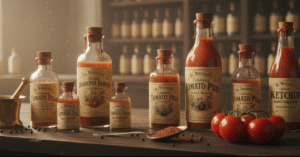If you’re anything like me, you probably consider ketchup a must-have for a perfect burger or a plate of crispy fries.
It sounds absolutely ridiculous, but the historical record is undeniable: Ketchup was a cure for diarrhea in the 19th century.
This bizarre shift from medicine cabinet to dinner table is one of the most fascinating tales in food history. It perfectly illustrates the blurry lines between early food science and outright quackery.
We’re talking about a time when this common condiment was patented and sold in pharmacies as a miracle drug.
The Journey: From Fish Sauce to Pharmaceutical
To truly understand this fact, we need to go back before the tomato was involved.
The term “ketchup” is believed to originate from the Chinese term kê-tsiap, a fermented fish sauce dating back to 300 B.C.
British traders brought this concept to Europe, where it was replicated using mushrooms, walnuts, or even anchovies. It was a savoury, dark condiment, but it was certainly not medicine.

When Did Tomatoes Enter the Picture?
Tomatoes were viewed with suspicion in the West for a long time. They belong to the nightshade family, and many Europeans feared they were poisonous.
It wasn’t until the early 19th century that their reputation began to change, particularly in the United States.
Dr. Bennett’s Tomato Pills: The Medical Craze
The person responsible for transforming the tomato—and subsequently ketchup—into a supposed cure-all was Dr. John Cook Bennett.
Bennett was an Ohio physician and an eccentric figure who championed the medicinal value of tomatoes.

The Scientific (Mis)Claim
Around 1834, Dr. Bennett began promoting the idea that tomatoes were rich in compounds that could treat a variety of ailments, including jaundice, indigestion, and diarrhea.
This was a time when medical knowledge was limited, and natural remedies were highly sought after. He theorized that the fruit contained potent digestive and nutritional properties.
He didn’t just recommend eating raw tomatoes; he took it a step further.
He worked with a man named Archibald Miles to create “Tomato Pills” and extracts from the tomato. These pills were heavily marketed as a sure-fire stomach remedy, with one popular jingle claiming, “Tomato pills will cure all your ills!”
The belief that ketchup was a cure for diarrhea in the 19th century quickly became a nationwide craze.
Why This Specific Detail Matters
Historians often focus on the broad shift of ketchup, but they sometimes overlook the extreme nature of the medical claims. The fact that this common food item was specifically marketed to treat a life-threatening symptom like diarrhea demonstrates the public’s desperation for remedies in the 19th century.
By highlighting the specific ailment (diarrhea), we underscore the shocking leap of faith that consumers took in that era, making the fact far more impactful for the modern reader. It’s truly astonishing that ketchup was once used as a cure for diarrhea.
The End of the Medical Ketchup Era
This lucrative medical trend did not last long. By the 1850s, the market was flooded with imitators and unscrupulous salesmen.
Many of the so-called “tomato pills” being sold contained little to no actual tomato—some were just laxatives or other cheap substances. This meant that the actual effectiveness of the “cure” was zero.
The Role of Fraud and Public Doubt
The rampant fraud quickly eroded public trust. As investigations revealed the pills were ineffective or outright fake, the idea of ketchup as a medicine collapsed.
The brief period where ketchup was a cure for diarrhea in the 19th century had officially ended.
However, the popularity of the tomato itself did not fade. The stage was set for the sauce to transition back into the culinary world.
It was entrepreneurs like Henry J. Heinz who stepped in. In 1876, Heinz introduced a new recipe that emphasized the use of ripe tomatoes and added distilled vinegar, which acted as a natural preservative.
Most importantly, he sold it in clear glass bottles to prove the purity of his product—a direct response to the era of fraudulent pills.

My Takeaway (The Real Lesson)
This story reminds us that even our most familiar household items have a dramatic and often unbelievable past.
Think about it: a century of scientific advancement is the only thing separating your current condiment from a snake oil salesman’s cure. It makes you appreciate the quality standards we have today.
The next time you reach for the ketchup bottle, remember that once upon a time, you would have been reaching for the medicine cabinet! The surprising fact that ketchup was a cure for diarrhea in the 19th century paved the way for the culinary staple we adore.

